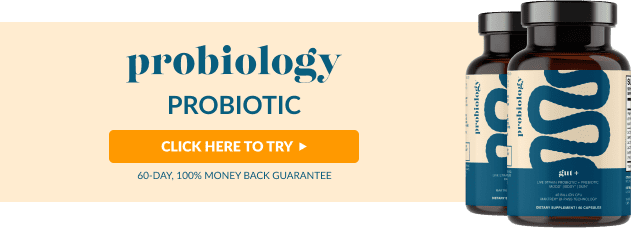Probiotics are “good” bacteria, and are often used to treat an unhealthy gut, as well as a wide range of other health issues.
As is the case with anything unfamiliar you put in your body, you may be wondering about their potential side effects – with one of the most talked about effects being increased gas. But, do probiotics really cause gas?
To give you the short answer, yes, probiotics can cause gas, among many other side effects. However, these can often be prevented if you take the right precautions, and it should only last a couple of weeks.
This guide will take an in-depth look at the use of probiotics, including how they work, their benefits, and the side effects associated with taking them. We’ll also answer some of the more frequently asked questions about probiotics.
What Exactly Are Probiotics?
As defined by the World Health Organization (WHO), probiotics are “live microorganisms which when consumed in adequate amounts as part of food confer a health benefit on the host.”
In other words, probiotics are helpful bacteria – so if you want to add good bacteria to your gut, you can do so by consuming probiotics. They’re typically found in certain food and supplements.
How Do They Work?
If you’re wondering why you need gut flora in the first place, probiotic bacteria are essential for a number of bodily functions.
For example, good gut bacteria helps you digest your food effectively, regulate your immune system, process vitamins, and much more.
Not all bacteria in your gut are good, however. Sometimes unpleasant bacteria can overgrow in the intestine, potentially causing a considerable amount of damage to your digestion.
The collection of microorganisms (like bacteria) living in your gut is called the gut microbiome. Possessing too much bad bacteria in your microbiome can lead to several digestive issues, including gas, bowel problems, and bloating.
Therefore, a balanced microbiome is essential for efficient digestion – and unsurprisingly, you want the balance to heavily tip toward good bacteria, which can be aided by probiotics.
In addition to adding beneficial bacteria directly to the microbiome, probiotics also exert antimicrobial activity against bad bacteria in the gut. In other words, this means that they can help remove bad bacteria, bringing a healthy balance back to your gut microbiome.
What Are The Benefits Of Probiotics?
There are a number of benefits associated with balancing your microbiome with probiotics. Listed below are six of the most important probiotic benefits.
Constipation – several studies have shown that probiotics will improve stool frequency and consistency, so you won’t feel constantly constipated.
Gas – excess gas is associated with dysbiosis (imbalanced microbiome), and addressing dysbiosis with probiotics has been proven to significantly decrease the amount of gas produced in your gut.
Acid Reflux – again, acid reflux demonstrates a connection with dysbiosis. So, rebalancing your microbiome with probiotics can have an advantageous effect on reflux symptoms. Learn more about yogurt for acid reflux.
Bloating – dysbiosis can lead to poor muscle contraction in your intestines, which in turn results in bloating. There are certain types of probiotics that can offset this chain reaction to alleviate your bloat.
Immune System – probiotics can improve your immune system by effectively regulating the function of the immune cells.
Mental Health – unsurprisingly, the gut microbiome isn’t someone’s first thought when going through mental health issues. However, dysbiosis has been shown to increase anxiety and depression, so probiotics that address dysbiosis may be able to improve these feelings.
In addition to the benefits listed above, there are several other advantages to consuming probiotics. These include the regulation of autoimmune diseases and skin issues.
While this extensive list of benefits is certainly impressive, just be mindful that buying any old probiotic isn’t going to magically put an end to your constipation, gas, bloating, and acid reflux all at once. Each strain of probiotic has a different effect, and finding the right one for you can take time.
Therefore, it’s essential to identify which probiotic strain will help you meet your goal, so you can then use it to address the issue.
Can Probiotics Cause Gas?
Unfortunately, there are a range of side effects related to probiotics, one of which is gas. Others include flatulence (passing gas), bloating, and headaches.
Thankfully, there are plenty of reasons why this might be happening, as well as some effective methods to fix it. So, why exactly do probiotics cause gas?
Well, changes to your gut bacteria – even if they’re positive changes – can lead to potential side effects such as gas and bloating at first.
It’s worth noting that the majority of people don’t experience any side effects with probiotics, and even if they do, the effects usually wear off after a couple of weeks of consistent use.
Keeping in mind your personal food sensitivities is a good idea when picking out a probiotic because many of them may contain an allergen in their ingredients.
So, if you’re allergic to dairy, it’s important to make sure that you’re using a dairy-free probiotic. These may be harder to find, but do exist.
If side effects persist after a couple of weeks and are particularly bothersome, it may be beneficial to find a new probiotic supplement to see if your body tolerates it better. After all, probiotic strains all act differently, so you may be better-suited to one strain than another.
If you’re still worried about some of the potential side effects, you could always start off with small doses and slowly work your way up over time. By doing this, you’ll allow your body to properly adjust to the probiotics and in turn, mitigate many of the side effects.
What About Intense Side Effects?
While mild and short-term side effects are possible when you start taking a probiotic, no side effect should be overly bothersome or intense.
If, however, your symptoms are severe and don’t dissipate after a couple of weeks, it’s a good idea to stop the probiotic and see a healthcare professional to find out what’s going on.
Often, severe side effects from probiotics may be related to a significant imbalance in the gut microbiome that can’t be rectified with probiotics alone.
You may also want to consider trying a different type of probiotic, especially if you’re worried that there might be something in the formulation that’s causing a problem for you.
For example, you could try a non-dairy probiotic if you think you might have a problem with dairy – a common ingredient in many probiotics.
The Bottom Line
To conclude, probiotics may cause some gas at first, but this side effect should wear off after a couple of weeks of consistent use. This is the same for other side effects.
A good method of reducing the intensity of probiotic side effects is to start with low doses and slowly work your way up to the recommended full amount. It’s also vital to make sure that you’re not sensitive to any of the probiotic’s contents.
Finally, if your reaction to probiotics is longer than a couple of weeks or particularly severe, you should talk to a health professional before continuing to take them.

Here are other articles on gas to learn more:
- Will Probiotics Help With Gas?
- What are Sulfur Burps?
- Tight Feeling in Upper Stomach
- Can I Drink Alcohol While Taking Probiotics
- Probiotics for Elderly
Frequently Asked Questions
How do you know if probiotics are working?
You will know if probiotics are working once you start seeing changes. There are several positive changes in your body that you can notice when you take a high-quality probiotic supplement or food. These range from improved digestion and a more efficient immune system to improved mental health and clearer skin. More often than not, the first and most immediate change people recognize is more efficient levels of digestion.
Should I take probiotics in the morning or at night?
Generally, probiotics are most effective when taken on an empty stomach. This makes sure that the helpful bacteria reach the intestines as quickly as possible. Therefore, the best time of day to take probiotics is either early in the morning before eating breakfast or last thing at night before going to sleep.
Can fillers in a probiotic supplement cause side effects?
It’s always worth checking any fillers that your supplement may contain, as it’s possible to have an adverse reaction to them. In general, opting for a filler-free probiotic supplement is your safest bet.
How long does it take for probiotics to start working?
For the vast majority of people, it takes at least 2-3 weeks to feel the probiotics start working. Any significant benefits from taking probiotics will take a little time. This is because it takes time for the probiotics to accomplish three of their main aims: increase your “good” bacteria count, lower your “bad” bacteria count, and reduce any significant inflammation in the body.

